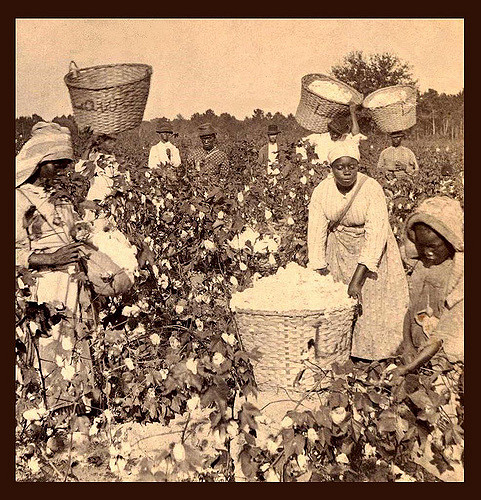What picture comes into your mind when you think of slavery?
Pickin’ cotton in Georgia (c. 1860)
No doubt, many of you will think of slaves picking cotton in the American South over a hundred years ago. You may even have seen the TV series “Roots” and formed the impression that being a slave was worse than terrible. Working up to 18 hours a day, without weekend breaks, many died within a decade of arriving on the plantation[i]. Marriages and families were often split up when one partner was sold. Punishment for slaves who were re-captured after escaping was brutal.
How does this apply to the way we think about slavery in the New Testament? In the first place, it wasn’t restricted to black people; all races, including Europeans might be held as slaves! But the more important question is “was it the same, better or worse”? Well the short answer is “it depends”[ii]. If you were captured in battle and forced into slavery, life under Roman rule could be just as brutal as that of the American slave. A criminal punished with slavery in the mines fared in much the same way.
On the other hand,
“The lot of the urban slaves was generally easier than that of their rural counterparts. Their work was lighter, and the conditions under which they lived and worked were incomparably better. … Some controlled large sums of money … and apparently were able to call much of that money their own. Greek and Roman authors complained constantly about high-flying slaves who were richer than they were. … There are a number of other examples, … of slaves who made money. For them in particular, as for most urban slaves, freedom was always a possibility. In most cases this was not so for rural slaves.”[iii]
From all the evidence that can be gleaned from ancient documents, life as a 1st century slave –
1) didn’t happen to people from just one race or nation;
2) could be as harsh as that of a black African slave in 18th century America, if you were a convict or a prisoner of war;
3) could be relatively less harsh if
a) you lived in a city rather than in the countryside;
b) your master was kind and/or rich;
4) meant that you had no legal status – you were worse off than a prisoner who had served their time;
5) meant a lifetime of service, unless you could buy your freedom, or unless your master freed you;
6) meant that your master had total control over every aspect of your life – including the right to have sexual intercourse;
7) meant that you might be branded on the forehead with your master’s mark;
8) meant that you could be bought and sold at will;
9) meant crucifixion if you were caught running away, or if you committed all sorts of crimes, including ones that would today be considered minor.
When referring to slaves, the New Testament writers make no mention of whether they were urban or rural. However, the majority of New Testament churches were based in medium to large cities. Hence we might conclude that Paul and his fellow Apostles only knew Christian slaves whose lives were relatively stress-free. Unfortunately, this doesn’t tally with some of the things we find in Scripture.
The Apostle Paul used some of the brutal facts of slavery to illustrate some of the truths of our life as Christians. However, and most importantly, the New Testament does NOT condone slavery, even though some, mostly non-Christians, maintain that it does.
To “dig deeper”, CLICK HERE to download the full article.
[i] Source : http://abolition.e2bn.org/slavery_69.html, accessed 14 Feb. 17
[ii] “Slavery was diverse in practice and ideology from nation to nation. It was diverse even within the Roman Empire itself. Those who were enslaved in an urban setting experienced a better (or at least improved) quality of life than those who worked on large farms or in the mines. A slave’s quality of life depended upon their function, relation to the master and the degree of responsibility carried by the slave.” John Byron (2004) “Paul And The Background of Slavery: The Status Quaestionis in New Testament Scholarship,” Currents in Biblical Research, 3.1, p 133
[iii] Williams, David, J. (1999) Paul’s Metaphors: Their Context and Character, Hendrickson Publishers Inc, ISBN-13: 978-1565632875, p 112

